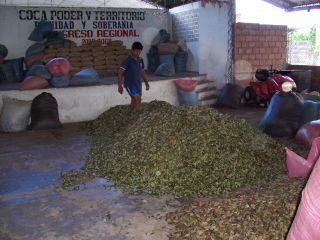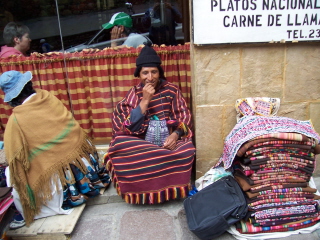 Criminal apostate New York State Governor Eliot Spitzer proposes tax upon popular substances as Marijuana, cocaine, etc., WITHOUT the protection of law.
Criminal apostate New York State Governor Eliot Spitzer proposes tax upon popular substances as Marijuana, cocaine, etc., WITHOUT the protection of law.Proposal would again make the courts accomplices to crime.
N.Y. Gov. Proposes Drug TaxAnd from New York State:
January 24, 2008 News SummaryNew York Gov. Eliot Spitzer this week proposed imposing a tax on sales of illicit drugs, adopting a concept already in place in 29 other states, the New York Times reported Jan. 24.
Seeking to close a $4.4-billion budget gap, Spitzer proposed a commodity tax on drugs as part of a broader package of taxes and fees, perhaps hoping to emulate the success of states like North Carolina, which collected $11 million in taxes on illegal drugs and alcohol last year.
Spitzer estimated that a drug tax could raise $17 million annually for New York. The tax would be $3.50 per gram of marijuana and $200 per gram for other drugs, but paying the tax would not shield dealers from criminal prosecution on possession charges.
In other states, such laws have led to litigation, with some struck down for violating constitutional protections against self-incrimination. As a result, many state laws now say that taxes can be paid anonymously, and that taxpayers cannot be reported to police.
In North Carolina, a federal appeals court ruled that the states was violating double-jeopardy rules by effectively punishing drug dealers twice, first with jail time and then with high taxes. The North Carolina tax was subsequently amended, and the state has a special division within its Department of Revenue devoted to collecting drug taxes.
Since few dealers pay the tax up front, most of the collections come after dealers are arrested on criminal charges.
http://publications.budget.state.ny.us/eBudget0809/fy0809artVIIbills/REVENUEConsBMwtoc.htm#partGSuch laws only increase the government's liability for its criminal drug war mercantilism scheme.
Part G– Require a tax stamp on illegal drugs.
Purpose:This bill improves the enforcement and tracking of illegal drug trafficking by requiring all marihuana and controlled substances to have a tax stamp.
Summary of Provisions, Existing Law, Prior Legislative History, and Statement in Support:
This bill would amend the Tax Law to add a new Article 17-A, requiring a tax stamp on all marihuana and controlled substances acquired or possessed by a dealer in this state. Marihuana and controlled substance are defined in the bill to parallel existing definitions in the Penal Law and Public Health Law. Under the bill, “dealer” encompasses every person who manufactures, produces, acquires, possesses, ships, sells, distributes, transfers or transports in this state, or imports or causes to be imported into the state, marihuana or a controlled substance.
The bill sets a tax stamp rate for marihuana of $3.50 per gram, and of a controlled substance at $200.00 per gram or fraction thereof, whether pure or dilute. The tax is paid by the dealer, in advance of his or her receipt of the marihuana or controlled substance, through the purchase of tax stamps from the Department of Taxation and Finance (“Department”). Upon receipt of the product, the dealer must affix enough stamps to the packages of marihuana or the controlled substance in order to show the tax has been fully paid.
All marihuana and controlled substances within the State are presumed subject to the tax. The bill exempts from the tax, however, all marihuana and controlled substances acquired or possessed by the United States, by the State of New York and its legal subdivisions, or by an employee of a state, local or federal government who legally acquires or possess the product as part of his official duties. In addition, anyone lawfully acquiring or possessing marihuana or a controlled substance, e.g. pursuant to Article 33 of the Public Health Law, is exempt from tax.
The bill requires prompt notification of the Commissioner of Taxation and Finance (“Commissioner”) by all law enforcement agencies and district attorneys who obtain any information that indicates that a dealer has failed to pay the tax due under Article 17-A. This requirement does not apply, however, if providing the information would violate a legal prohibition or would interfere with an ongoing criminal investigation or prosecution.
The bill contains a unique and strict secrecy requirement, preserving the confidentiality of any information obtained from a dealer under Article 17-A. Disclosure of this information is generally prohibited, although it may be disclosed for purposes of a criminal or civil proceeding involving taxes under Article 17-A. However, the bill specifically provides that none of the information may be used against the dealer in any criminal proceeding (other than a tax crime) unless it has been obtained independently.
The bill provides that all moneys received under Article 17-A are to be deposited into the general fund of the state.
A wide array of enforcement provisions is set out in the bill to ensure proper collection of the tax. These provisions include a civil penalty for failure to pay the tax, an authorization of jeopardy tax assessments, and criminal sanctions for various offenses.
Twenty-nine states– Alabama, Arizona, Colorado, Connecticut, Florida, Georgia, Idaho, Illinois, Indiana, Iowa, Kansas, Kentucky, Louisiana, Maine, Massachusetts, Minnesota, Montana, Nebraska, Nevada, North Carolina, North Dakota, Oklahoma, Rhode Island, South Carolina, Tennessee, Texas, Utah, Wisconsin, and Wyoming have passed tax liability legislation for controlled substances.
Budget Implications:
Enactment of this bill is necessary to implement the 2008-09 Executive Budget because it would increase revenues by $13 million in 2008-09 and $17 million thereafter.
Effective Date:
This bill will take effect 90 days after it becomes law and will apply to marihuana and controlled substances possessed in the state on or after that date.















Bolivia should challenge US criminal mercantilism
Comment posted by Anonymous on Thu, 03/01/2007 - 1:15pmHas EVo Morales considered suing the US under any free trade provisions?
Or the fact that Coca is safer then Coffee and infinitely safer then Tobacco?
What about a law suit against the US government for mass murder, given that Tobacco takes 40 million lives annually, Coca takes 0, and that the US largely went after Coca in the early 1900s as a "tobacco habit cure"?